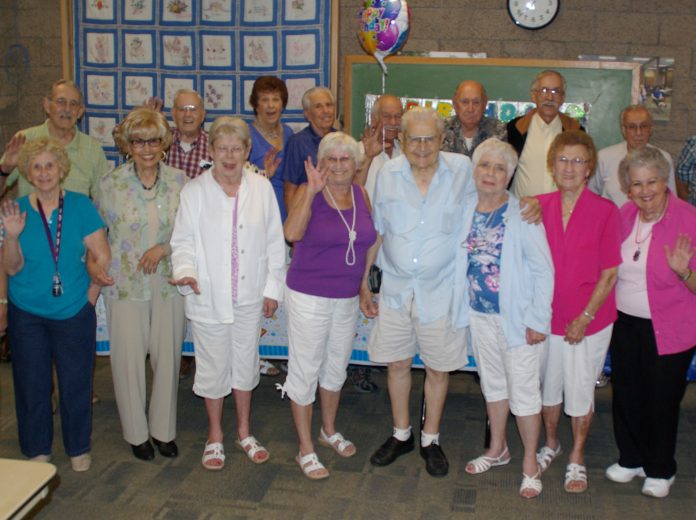Pinochle originated during the 19th century in the Swiss-German and Swiss-French areas of Europe, along with France, showing the most popularity in the 1950s.
Theodore "Ted" Settannil, who turned 99 last week, is an avid Pinochle player at the Garden Grove Senior Center and is a master of the game, faithfully playing four times each week at 12:30 p.m., where he joins other Pinochle enthusiasts.
Pinochle originated during the 19th century in the Swiss-German and Swiss-French areas of Europe, along with France, showing the most popularity in the 1950s.
Theodore "Ted" Settannil, who turned 99 last week, is an avid Pinochle player at the Garden Grove Senior Center and is a master of the game, faithfully playing four times each week at 12:30 p.m., where he joins other Pinochle enthusiasts.
"I tried all of the other senior centers in Orange County and the Garden Grove Senior Center is the best for Pinochle," he said. "They are fair and give everyone a chance to play; I've been coming here to play Pinochle for 13 years."
Pinochle is a card game for two or more players using a 48-card deck consisting of two of each card from 9 to ace, the object being to score points for various combinations and to win tricks with a combination of queen of spades and jack of diamonds.
Asked if he attributes his longevity to playing Pinochle, Settannil said, "It helps because it requires concentration and takes your mind off of your problems. My family didn't live to be exceptionally old because they smoked; I attribute my life beyond all of my family, to the fact that I gave up smoking a long time ago.
"I've been playing Pinochle for 60 years and got my start playing the game while living in Connecticut, where I was raised, even though I was born in Mt. Vernon New York."
Asked what brought him out to California, he gave a short answer. "The weather."
"My wife, Gwen (deceased two years ago at the age of 92), and I moved to California 63 years ago, where after my military service, I became a carpenter, later becoming a contractor in construction," he said. "I still do repairs around the house; when I get older, I won't be able to do that."
Settannil said he and his wife of 72 years raised two sons (one died of a heart attack at age 38). The other son, Jay, lives in South County and is 68 years old. Stettannil has six grandchildren and five great-grandchildren, with the oldest great-grandchild turning 21 in November.
"She's a model and has 3,000 friends on Facebook; that makes her a very popular model," said Settannil.
Settannil's military service was in the Army, where he served all over Europe during WWII, becoming a staff sergeant in the medical detachment over the Mortar Battalion.
"I was in the whole of the Europe Campaign until the Germans gave up in May 1945," Settannil said. "All of my comrades except one, who is 93, have passed on." May 8, 1945, both Great Britain and the United States celebrated victory in Europe. Cities in both nations, as well as formerly occupied cities in Western Europe, put out flags and banners, rejoicing in the defeat of the Nazi war machine. May 8 was the day when German troops throughout Europe finally laid down their guns. In Prague, Germans surrendered to the Soviets, after the Soviets lost more than 8,000 soldiers, and the Germans even more.
The German surrender was the final cease-fire and additional surrender documents were signed in Berlin and Eastern Germany. History records the main concern of German soldiers was to keep from being taken as Soviet prisoners.
Approximately 1 million Germans attempted an exodus to the West when the fighting in Czechoslovakia ended but were taken captive by the Russians, who took approximately 2 million prisoners in the period just before and after the German surrender. More than 13,000 British POWs were released and sent back to Great Britain, while pockets of German-Soviet confrontation continued to the next day.
On May 9, the Soviets lost 600 more soldiers in Silesia before the Germans finally surrendered.
V-E (Victory Europe) Day was not celebrated until the 9th of May in Moscow, with a radio broadcast salute from Stalin saying, “The age-long struggle of the Slav nations… has ended in victory. Your courage has defeated the Nazis. The war is over.”
For Settannil, the war may be over, but the battle of Pinochle continues…












